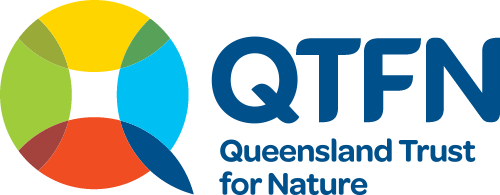Landcare WIRES Grant
New nest boxes monitoring on Koala Crossing
At QTFN, we’re constantly working to deliver more growth, opportunity and longevity: renewing (and repurposing) natural assets, providing new investment opportunities, growing returns and results, and extending benefits further across environmental, economic, social and cultural outcomes.
In 2020, QTFN was a successful recipient of a WIRES-Landcare Wildlife Relief and Recovery Grant. This follows the devastating summer that saw significant areas of our south east Queensland scrub impacted by wildlife and many years of prolonged drought.
Through this grant, QTFN set out to drought proof Koala Crossing – a 650ha koala conservation property in the Flinders Karawatha Corridor, SEQ.
QTFN has been actively restoring the land through weeding and revegetation but the existing vegetation is predominantly regrowth forest. On its way to be ecologically functioning systems, but currently lacking the large hollow bearing trees many of our wildlife species rely on.
This grant allowed us to supplement the habitat with nest boxes, drinking station and a new rainwater tank.
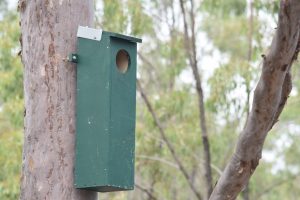
Over 40 nest boxes were made by the Ipswich Men’s Shed and installed across the property, all designed specific to different species needs.
Did you know it’s not as easy as putting up a wooden box?!
Different species have different requirements. For example, the feather tailed glider, __grams in weight and small enough to fit in the palm of your hand. It needs an entrance hole large enough to access, but small enough to keep competitors out. The brush-tailed possum, a common and medium size native marsupials is quite a dominant animal and will inhabit any available habitat (including your suburban roof!)
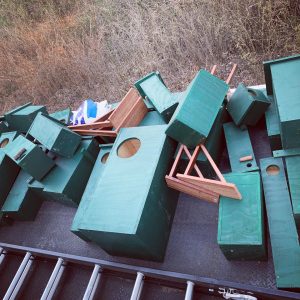
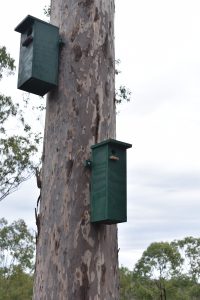
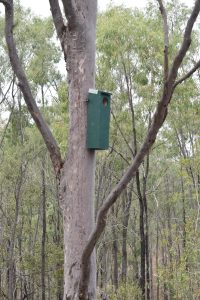
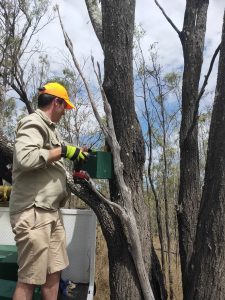
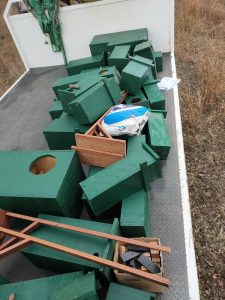
How do we know these nest boxes are helping our native wildlife?! With the help of this grant, we were able to invest in two you-beaut types of cameras. A nestbox inspection camera and 4G wildlife monitoring cameras.
We installed wildlife monitoring cameras at three of our nest boxes to keep an eye on who is visiting. With 4G connectivity, they are able to send us regular updates. And every month, we personally check on the nest boxes to ensure they are clean, predator free and ready for our natives to make a home.
We’ve made a compilation of our favourite visitors so far. We will keep this page updated as the project continues.
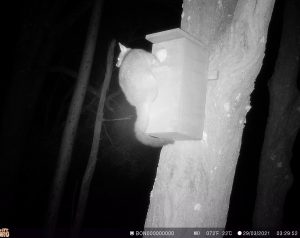
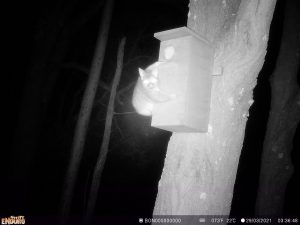
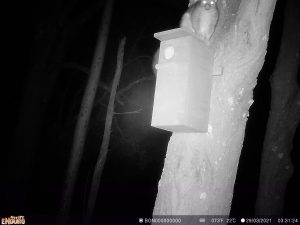
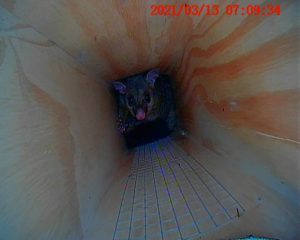
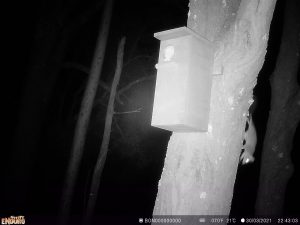
Introduction
In 2020, QTFN was a successful recipient of a WIRES-Landcare Wildlife Relief and Recovery Grant. This follows the devastating summer that saw significant areas of our south east Queensland scrub impacted by wildlife and many years of prolonged drought. Through this grant, QTFN set out to drought proof Koala Crossing – a 650ha koala conservation property in the Flinders Karawatha Corridor, SEQ. QTFN has been actively restoring the land through weeding and revegetation but the existing vegetation is predominantly regrowth forest. On its way to be ecologically functioning systems, but currently lacking the large hollow bearing trees many of our wildlife species rely on. This grant allowed us to supplement the habitat with nest boxes, drinking station and a new rainwater tank. 
Nestboxes
Over 40 nest boxes were made by the Ipswich Men’s Shed and installed across the property, all designed specific to different species needs. Did you know it’s not as easy as putting up a wooden box?! Different species have different requirements. For example, the feather tailed glider, __grams in weight and small enough to fit in the palm of your hand. It needs an entrance hole large enough to access, but small enough to keep competitors out. The brush-tailed possum, a common and medium size native marsupials is quite a dominant animal and will inhabit any available habitat (including your suburban roof!) 




Who Lives here!?
How do we know these nest boxes are helping our native wildlife?! With the help of this grant, we were able to invest in two you-beaut types of cameras. A nestbox inspection camera and 4G wildlife monitoring cameras. We installed wildlife monitoring cameras at three of our nest boxes to keep an eye on who is visiting. With 4G connectivity, they are able to send us regular updates. And every month, we personally check on the nest boxes to ensure they are clean, predator free and ready for our natives to make a home. We’ve made a compilation of our favourite visitors so far. We will keep this page updated as the project continues. 




